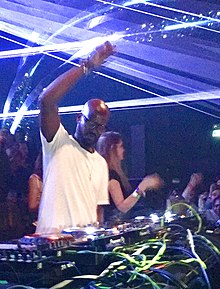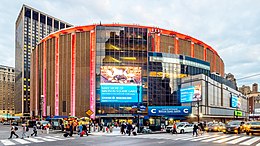Afro house (also spelled as Afro-house or Afrohouse)[1] is a sub-genre of house music mainly developed in South Africa.[2] The genre emerged in the 1990s.[3][4]
| Afro house | |
|---|---|
| Stylistic origins | |
| Cultural origins | 1990s, South Africa |
| Typical instruments |
|
| Derivative forms | Gqom |
| Subgenres | |
| Afro tech | |
| Other topics | |
Name and characteristics
Since kwaito was already developed in South Africa before or possibly during the emergence of afro house.[4] It appears the name made immediate differentiation usage of the prefix 'afro', which in context by definition literally means anything relating to Africa and African culture[5] as well as, the seemingly obvious suffix, 'house', in direct relation to house music.
The genre is principally a blend of traditional house, kwaito, mbaqanga, deep house, tribal house, and soulful house.[2] It features various South African languages.[6][7] The BPM commonly shifts between 80 and 122 and in some instances, up to even 160.[2][7][8]
Notable women in Afro house
South African record label, Afrotainment (Ezase Afro)[9] housed one of the first notable female Afro house artists, namely, DJ Cndo[10] in the early 2000s.[11][12] Her debut album released in 2007, Finest Lady of House Vol.1 obtained gold record status, which would likely have been considered a momentous achievement, during the CD records, era.[13][14]
Vocalist, Bucie is regarded as "the female voice of South African house music",[15][16] presumably Afro house especially in reference to one of her Afro house hit singles "Superman"[17][18] which was produced by Black Coffee in 2009 and was later sampled by Drake in 2017 for his More Life album featuring Jorja Smith.[19] British "Kiss From A Rose", songster Seal claimed that he liked her music and mentioned that Bucie is "a great singer and artist".[17]
In 2012, DJ Zinhle "My Name Is" featuring Busiswa hitmaker,[20] co-founded Fuse Academy. A DJ academy specifically for female,DJs.[21]
In 2016, songstress Alicia Keys enlisted Black Coffee for one of her "In Common" official remixes,[22] which was recognized and received well, internationally.[23] Zimbabwean, Songwriter and singer, Jackie Queens launched her record label Bae Electronica which solely showcases women house artists, such as Thandi Draai[24] who according to Mixmag has been "heralded as SA house music's femmetastic triple-threat".[13][25][26]
History
Ostensibly before it was 'officially' named and categorized as a sub-genre, it was just referred to as simply, "house".[27][4]
The genre appeared to have been, in some cases unintentionally labeled and mistaken as UK funky or afrobeats.[28]
Foreseeably, many former kwaito and kwaito-correlating artists for instance Oskido, DJ Tira, Mafikizolo,[29] Black Coffee,[22] DJ Cleo,[30] Thandiswa Mazwai,[31] Big Nuz[32] and Mahoota (member of Trompies)[33] have been ceaselessly associated with the genre for decades.[4][10]
Other ceasless artists include Osunlade, Louie Vega, Pablo Fierro,[34] Darque, Djeff Afrozila, Jazzuelle, Hyenah,[35] Rancido, Floyd Lavine,[34] Boddhi Satva[36] and Keinemusik Crue(Kloud).[6][37][38]
It was broadly internationally spearheaded by Malaika, Black Coffee, DJ TekniQ DJ Fresh,[39] DJ Tira, Zakes Bantwini, DJ Cndo, Da Capo, Bucie, Culoe De Song, Shimza, Punk Mbedzi, Enoo Napa and Black Motion.[6][40][10]
1980s

The genre is thought to have possibly been, in effect created in the late 1980s due to the hitherto heavy, presence of kwaito, mbaqanga and house both locally as well as internationally.[41][4] This time period was unfortunately during the apartheid regime whereas information would evidently have not been easy to record nor share.[42] Kwaito-associated acts such as Brenda Fassie and Sipho Mabuse were high-charting artists on global charts such as on KISS-FM and Capitol Radio during the 1980s and 1990s.This would outwardly be the world's first introduction to "South African house music".[43] Artists such as Vinny Da Vinci,DJ Christos and Revolution twins[44] were hosting parties and DJing in various locations.[4]
I was working in townships before [Apartheid ended], and I'd get a lot of shit if I was caught. I mean, even name-wise I was never Christos. I changed my name like five times to avoid the cops.
— DJ Christos, DJ Mag
1990s
During this period the genre's universality in various locations such as the United States was set in stone. American artists such as Grammy-award-winning, Louie Vega had been regularly frequenting South Africa during this time.[3] There is also evidence of the genre having being popularized in Angola due to the local dance culture. This is partially attributed to the musical genre kuduro.[45][46]
In 1994, the South African record label House Afrika was established. The label was founded by Vinny Da Vinci (Vincent Motshegoa),[47] Tim White and DJ Strat3gy(Glen van Loggerenberg). The label's debut album release was titled Fresh House Flava Vol.1 by DJ Fresh.[citation needed]
Some had friends at airlines and would ask them to bring tracks back in their luggage. Others would pay people to be couriers and get tunes into the country. Whether you call this bootlegging, or contraband, you made the most of any way you could get at the music.
— Vinny Da Vinci, DJ Mag
2000s
In 2001, House Afrika released "Oskido's Church Grooves".[48]
In 2003, Malaika's "Destiny" topped, charts.[49] The South African trio toured Australia alongside Zimbabwean, singer Tarisai Vushe who made it to the Top.5 of Australia Idol, 2007 as their supporting act.[50]

In 2005, South African Grammy-award-winning artist, Black Coffee released his debut self-titled album Black Coffee.The album appeared to be the first afro house album to win the South African Music Awards, Best Dance Album, category and featured other distinguished South African artists such as Hugh Masekela and Thandiswa Mazwai.[51][31]
The genre had subsequently become popularized in even more parts of the world including South America, Europe, and Asia.[6][52] In, London although already conceivably, presumbably present since the 1980s, its emergence appeared to have become solidified during this period as well as to a greater extent accredited to "giving rise to" the, UK funky, scene.[53]
According to an interview American DJ, Osunlade had visited South Africa, for the first time in 2005.[54]
DJ Cleo, released his first hit-single,"Goodbye".[30]
In 2007, DJ Sbu's "Remember When It Rained" won Best Song of the Year, at the South African Music Awards.[55]
"Umlilo" released by Big Nuz featuring DJ Tira and DJ Fisherman in 2009, won three South African Music Awards.[32]
Culoe De Song, released his debut album "A Giant Leap". It won Best New Artist at the South African Music Awards. The album was inclusive of one of his most popular releases "Webaba".[56]
Between the 2000s and 2010s the genre appeared to have been most prominent in its native region, South Africa as well as the UK.[53]
2010s
Between the early 2010s and 2020s there was a surge in the number of Afro house releases and popularity.[57][58][59] During these decades the genre's maturation had accelerated.[1][60]
In 2011, identical twins band, Revolution released "Teka Munike" featuring Mozambiquan, songstress Ruby Gold.[61]
In 2012, afro house duo Vetkuk vs. Mahoota released the song "Via Orlando" featuring Dr. Malinga,[62] the song was a rendition of Monwa & Sun's 1988 released "Orlando Hangover"[63] ,the song's release in all probability, inspired other South African afro-house hit-singles thereafter most notably, in 2013 kwela and afro house duo Mafikizolo featuring Uhuru's "Khona".[29]

In 2014, Mafikizolo won eight awards at the South African Music Awards.[64] Mi Casa won the Best Dance Album, DJ Kent[65] ft. The Arrows, The Highest Airplay of the Year, for "Spin My World Around" and Oskido, Remix of the Year, for "Tsa Ma Ndebele".[64]
Portuguese artists such as DJEFF (formerly known as Djeff Afrozila[66]) accelerated the genre's popularity by performing a live mix from the DJ Mag, headquarters in Hoxton.[67]
Central African, music producer Boddhi Satva and Congolese songster Kaysha, released their best-hit, single, "Mama Kosa".[36]
DJ Clock[68] and band, Beatenberg, won six awards at the South African Music Awards for "Pluto (Remember You)". The smash-hit, also received the SAMPRA award, for Highest Airplay of the Year.[69]

At the time, South African 3-year-old, DJ Arch Jnr. appeared to be the world's first, youngest DJ. He won SA's Got Talent,[70] received a standing ovation for his performance on America's Got Talent[71] and competed in "World's Got Talent" in China.[72] Arch Jnr. obtained and holds a Guinness World Record as the youngest, club DJ in the world.[73]
In 2016, Gondwana KE[74] was founded in Kenya by Eugene Onyago and Suraj Mandavia, the event and label predominantly showcases South African Afro house artists such as Karyendasoul, Citizen Deep, Punk Mbedzi, Frigid Armadillo[1] and Sun El Musician.[75] As well as Kenyan, afro-house,artists such as Ayrosh.[75]
The "Koze Kuse" hit-maker, DJ Merlon released the album "Original Copy".[76]
Angolan, producer Afro Warriors released "Uyankenteza" featuring vocalist, Toshi. The song was remixed by Hyenah.[77]
In 2017, Beatport updated its platform with an additional Afro house category.[78]
In 2018, South African DJ and music producer, Euphonik won the Best Newcomer DJ, award at the DJ Awards under his new alias, "Themba".[79]
In 2019, four South African Afro house DJs were nominated at the DJ Awards for the "afro house", genre.[80] Da Capo won the first-ever, Afro House category, award.[81][38]
Usher and Black Coffee collaborated on "LaLaLa".[82] Prior to the song's release they performed together at the Global Citizen Festival: Mandela 100, in 2018.[83]
A video of the Hilton College marimba band, in KwaZulu-Natal performing the Black Coffee and French, multi- number 1 DJ, in the world, David Guetta,[84] song "Drive" featuring songstress, Delilah Montagu went, viral.[85]
Prince Kaybee and Msaki's,"Fetch Your Life"[86] won The House Record of the Year at the African Dance Music Awards.[87]
2020s
In 2020, Darque and Shimza[88] established, the afro-house, label Kunye as well as event U'R.[89]
Master KG and singer, Nomcebo Zikode's globally viral-hit , "Jerusalema" debuted on Billboard and Apple, music charts as number 1.[90] The song was largely accredited to popularizing song, dance-challenges.[91] The song's remix featuring Burna Boy reached diamond, status in France.[92] Nomcebo's debut hit-single, in 2018 "Emazulwini" featured DJ Ganyani.[93]
In 2021, the British house music record label, Defected Records launched an afro house label, Sondela, the first released song "Ezizweni" was by South Africans DJ Tira, Hyenah and jazz singer, Luke Ntombela.[35]
Afro-house, DJ and producer FKA Mash paid homage to kwaito, mbaqanga, marabi and kwela in his "Love Songs From Soweto", album.[94]

South African poetic afro-house, vocalist, DJ and producer Lazarusman as well as German, duo Booka Shade were nominated at the Grammies for the album, "Dear Future Self".[95]
David Guetta, Master KG and Akon released the single, "Shine Your Light".[96]
Francis Mercier, a DJ and producer based in New York, released his remake of the influential composition "Premier Gaou" by the globally acclaimed Ivorian music group, Magic System. The original version was one of Africa's biggest records, achieving widespread recognition on a global scale in the late 1990s. Mercier revitalized the song by sharing his afro-house rendition in collaboration with, Spinnin' Records.[97]
In 2022, Mixmag showcased German-Nigerian DJ JAMIIE at, The Lab Johannesburg.[98]
Chymamusique,[99] won Album of the Year, Best Dance Album and Male Artist of the Year for his album "Musique" at the South African Music Awards.[100]

In 2023, Black Coffee was the first African DJ and record producer, to fill up Madison Square Garden in New York City.[101] Supporting acts were inclusive of musicians such as songstress Bucie, Monique Bingham,[102] afro-house songster, Shoba (formerly Shota),[103] South African vocalist Portia Monique, singer and songwriter Msaki and a 12 piece-orchestra.[104]
German music collective, Keinemusik was listed as number 1, in the top-selling afro house charts on Beatport.[105] Mo Black Records founded by Italian Mimmo Falcone(MoBlack) in 2013,[106] was listed as the number 1, best selling record label on Beatport.[105]
Travis Scott[107] and Drake[108] joined Black Coffee at his live DJ, set performances.
When the South African national rugby team, the Springboks returned to South Africa, after winning the 2023 Rugby World Cup in France, they engaged in a brief, jollification to afro house, global hit-single "Osama" by Grammy-award-winning musician, Zakes Bantwini[109] featuring, Kasango.[110][111]
Notable record labels
Notable Afro house record labels include:
- House Afrika[4]
- MoBlack Records[106]
- Spinnin' Records
- Keinemusik